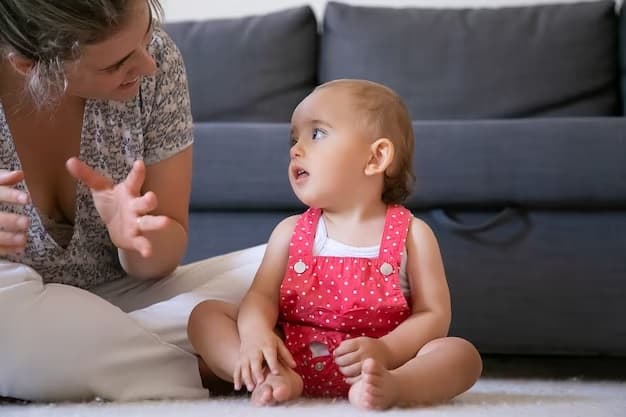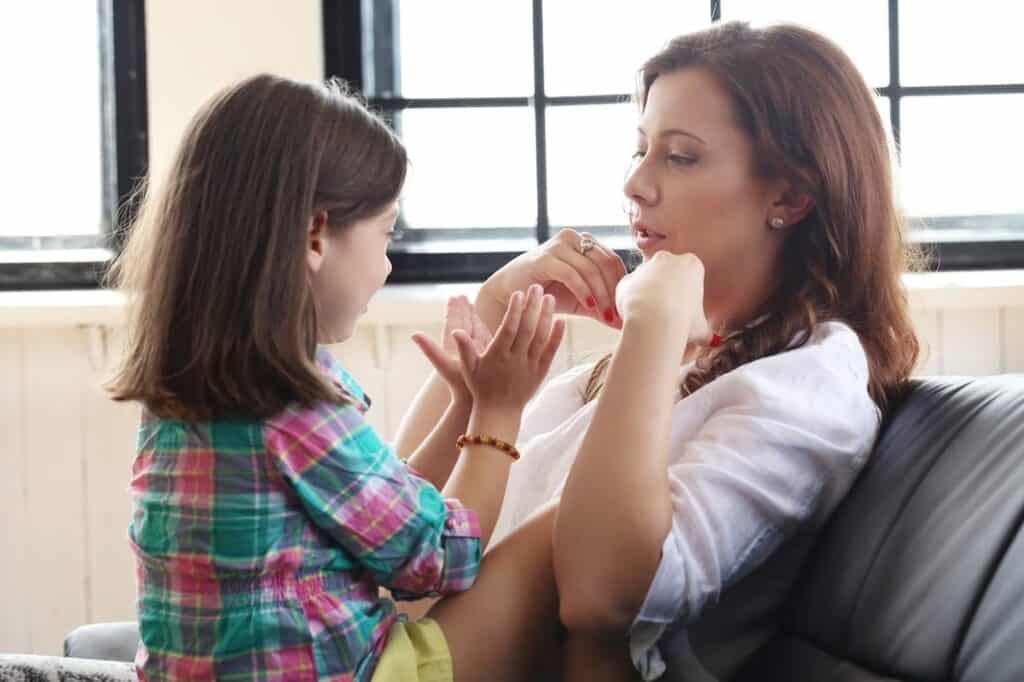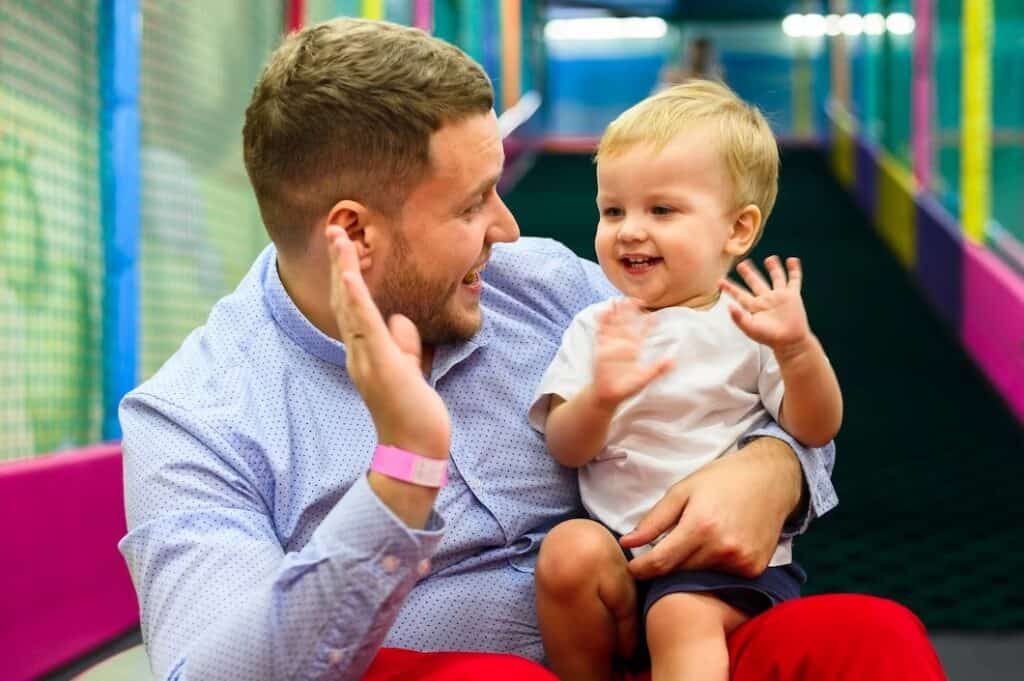Many parents eagerly await their child’s first words, but what happens when a 15-month-old is not yet speaking? While every child develops at their own pace, it can be concerning when a child is not meeting language milestones. Parents may wonder if their child has a speech delay or if there is an underlying issue causing the delay.
Understanding Child Language Development is important for parents to know when their child is not meeting language milestones. Children develop language skills at different rates, but there are general milestones that most children reach around certain ages. At 15 months, most children are able to say a few words and understand simple commands.
If a child is not meeting these milestones, it may be a sign of a speech delay. It is important to talk to a pediatrician or speech-language pathologist to determine if there is a problem and what steps can be taken to help the child.
Key Takeaways
- Children develop language skills at different rates, but there are general milestones that most children reach around certain ages.
- If a 15-month-old is not meeting language milestones, it may be a sign of a speech delay.
- It is important to talk to a pediatrician or speech-language pathologist to determine if there is a problem and what steps can be taken to help the child.
Understanding Child Language Development
Language development is a complex process that begins at birth and continues throughout childhood. Children learn language by listening to those around them and practicing their skills through conversation, narration, and mimicry. While every child develops at their own pace, there are some general milestones that can be used to track their progress.
Babies begin to communicate through babbling and baby talk, which is a form of gibberish that helps them practice the sounds and rhythms of language. As they approach their first birthday, they may begin to say their first words, such as “mama” or “dada.” By 15 months, most children are able to say several words and use them to express their needs and wants.

Expressive language, or the ability to communicate through spoken words, is an important aspect of language development. However, receptive language, or the ability to understand and interpret language, is equally important. Children who are not exposed to a variety of language and conversation may struggle with both expressive and receptive language skills.
Parents and caregivers can help support language development by talking to their child frequently, narrating their actions and surroundings, and encouraging conversation. Reading books together and singing songs can also be helpful in building vocabulary and language skills.
It is important to remember that every child develops at their own pace and may reach milestones at different times. However, if a child is not meeting developmental milestones or seems to be struggling with language skills, it may be helpful to consult with a healthcare provider or speech-language pathologist.
The 15-Month-Old and Language
At 15 months old, a child’s language skills are just beginning to develop. While some 15-month-olds may be speaking a few words, it is not uncommon for others to still be babbling and not yet talking.
Parents may become concerned if their child is not talking by this age, but it is important to remember that every child develops at their own pace. Some children may be late talkers and catch up to their peers later on.
During this stage, it is important for parents to encourage their child’s language development through social interactions, eye contact, and active listening. Parents can also help their child by watching and imitating their sounds and gestures, and by giving them simple directions to follow.
It is important to note that while a 15-month-old may not be talking yet, they should still be demonstrating some language skills, such as understanding simple directions and responding to their name. If parents have concerns about their child’s language development, they should speak with their pediatrician.
Normal vs Delayed Speech
At 15 months, most children are able to say a few words, such as “mama” or “dada,” and understand simple commands. However, some children may not be able to speak yet and are only babbling. This can be concerning for parents, but it is important to understand the difference between normal speech development and delayed speech.
Normal speech development involves a gradual progression of skills, starting with cooing and babbling around 4-6 months, and progressing to simple words and phrases by 12 months. By 15 months, most children are able to say a few words and understand simple commands. However, every child is different and may develop at their own pace.
Delayed speech, on the other hand, refers to a significant delay in speech development. It is important to note that not all late talkers have a speech delay or developmental delay. Some children may simply be late bloomers and catch up to their peers in a few months. However, if a child is not making progress in their speech development, it may be a sign of a more serious issue.
Speech delay can be caused by a variety of factors, including hearing problems, developmental delays, and language disorders. It is important to have a child evaluated by a healthcare professional if they are not meeting their speech milestones. Early intervention can help improve outcomes for children with delayed speech.
In summary, normal speech development involves a gradual progression of skills, while delayed speech refers to a significant delay in speech development. While every child develops at their own pace, it is important to have a child evaluated if they are not meeting their speech milestones. Early intervention can help improve outcomes for children with delayed speech.
Potential Causes of Delayed Speech
There are several potential causes for delayed speech in a 15 month old child. Some of the most common causes include hearing loss, speech disorders, language problems, and autism.
Hearing loss can be a significant factor in delayed speech. If a child is unable to hear properly, they may not be able to develop speech and language skills at the same rate as other children. It is essential to have a child’s hearing tested if there are concerns about their speech development.
Speech disorders, such as apraxia or dysarthria, can also cause delayed speech. These disorders affect a child’s ability to produce sounds and words correctly. Children with speech disorders may need speech therapy to help them develop their communication skills.

Language problems can also play a role in delayed speech. Children who are not exposed to enough language or who have difficulty understanding language may struggle with speech development. It is crucial to provide a language-rich environment for children to help them develop their language skills.
Finally, autism can be a potential cause of delayed speech. Children with autism may have difficulty with communication and social interaction, which can impact their speech development. It is essential to have a child evaluated for autism if there are concerns about their speech and language development.
Overall, there are several potential causes of delayed speech in a 15 month old child. It is essential to have a child evaluated by a healthcare professional if there are concerns about their speech development. Early intervention can be critical in helping children develop their communication skills.
Role of Pediatrician and Speech-Language Pathologist
When a 15-month-old child is not yet talking, parents may become concerned and seek advice from a pediatrician. The pediatrician plays a crucial role in monitoring a child’s speech and language development. During regular check-ups, the pediatrician can assess the child’s developmental milestones, including speech and language, and identify any potential concerns.
If the pediatrician identifies any concerns with the child’s speech and language development, they may refer the child to a speech-language pathologist (SLP). An SLP is a professional who specializes in diagnosing and treating speech and language disorders. The SLP can conduct a comprehensive evaluation of the child’s speech and language skills and develop a personalized treatment plan.
The SLP will work with the child and parents to provide therapy and strategies to improve the child’s communication skills. The therapy may include exercises to strengthen the muscles used in speech, activities to develop vocabulary and language comprehension, and techniques to improve communication and social interactions.
It is important to note that not all children develop at the same pace, and some may take longer to develop speech and language skills. However, if a child is not making progress in their speech and language development, it is essential to seek the advice of a pediatrician and, if necessary, a speech-language pathologist. Early intervention can significantly improve outcomes and prevent long-term communication difficulties.
Early Intervention and Speech Therapy
Early intervention is key when it comes to a child’s speech and language development. If a 15-month-old child is only babbling and not speaking any words, it may be time to consider speech therapy.
An early intervention program can be helpful in identifying any potential speech or language delays. These programs are designed to provide support and resources to families with children who may be at risk for developmental delays.
Speech therapy can also be a helpful tool in addressing any speech or language delays. A speech therapist can work with the child and their family to develop a plan for improving communication skills.

During speech therapy sessions, the therapist may focus on articulation, which is the process of forming sounds and words. They may also work on language comprehension and expression, as well as social communication skills.
It is important to note that every child develops at their own pace, and some children may take longer to develop speech and language skills than others. However, if there are concerns about a child’s speech and language development, early intervention and speech therapy can be beneficial in addressing any potential delays.
Promoting Language Development at Home
Parents play a crucial role in promoting language development in their children. Here are some ways to encourage speech and language skills at home:
Talking to Your Child
One of the most important things parents can do is to talk to their child regularly. Even if the child is not yet able to speak, talking to them helps to build their language skills. Use simple words and short sentences, and repeat words often. Encourage your child to respond, even if it’s just with gestures or sounds.
Reading to Your Child
Reading to your child is another great way to promote language development. Choose books with simple, repetitive language and colorful pictures. Point to the pictures as you read, and encourage your child to point as well. Ask questions about the story and encourage your child to respond.
Singing Songs and Nursery Rhymes
Singing songs and nursery rhymes is a fun way to promote language development. Choose songs with simple, repetitive lyrics and encourage your child to sing along. Clap along to the beat and use gestures to help your child understand the words.
Playing and Teach Through Play
Playing with your child is also a great way to promote language development. Play games that involve naming objects or actions, such as “I spy” or “Simon says.” Use toys and objects to encourage your child to talk about what they see and do.
Encourage Speech and Gestures
Encourage your child to use gestures and speech to communicate. When your child points to an object, name it for them and encourage them to repeat the word. Use simple gestures, such as waving or blowing kisses, and encourage your child to imitate them.
Social Communication
Encourage your child to interact with others. Arrange playdates with other children and encourage your child to share toys and take turns. Talk to your child about their feelings and encourage them to express themselves.

By following these tips, parents can help their child develop strong language skills and prepare them for future success in school and beyond.
Guidelines from the American Academy of Pediatrics
According to the American Academy of Pediatrics (AAP), most children start to say their first words between 10 and 14 months of age. However, it is not uncommon for some children to take longer to start talking. If a 15-month-old is not talking and only babbling, the AAP suggests the following guidelines:
Monitor the child’s hearing
One of the reasons why a child may not be talking at 15 months is because of a hearing problem. Therefore, it is important to have the child’s hearing checked by a pediatrician or an audiologist. If there is a hearing problem, it can be treated, and the child’s language development can improve.
Encourage communication
Parents can encourage their child to communicate by talking to them frequently, reading to them, and responding to their babbling. It is also important to give the child time to communicate and not interrupt or finish their sentences for them.
Use gestures and facial expressions
Using gestures and facial expressions can also help a child communicate. For example, waving goodbye, pointing to objects, and making facial expressions can help a child convey their message.
Socialization is important for a child’s language development. Parents can promote socialization by arranging playdates with other children, attending parent-child classes, and participating in community activities.
Monitor growth and development
It is important to monitor a child’s growth and development regularly. If there are concerns about a child’s language development, parents should talk to their pediatrician. The pediatrician can refer the child to a speech-language pathologist, who can evaluate the child’s language skills and provide therapy if necessary.

In conclusion, if a 15-month-old is not talking and only babbling, parents should not panic. Instead, they should follow the AAP guidelines and monitor the child’s hearing, encourage communication, use gestures and facial expressions, promote socialization, and monitor growth and development. With patience and support, most children will eventually start talking.
Related: How to Cope with a Child’s Diagnosis
Frequently Asked Questions
What are the typical language milestones for a 15 month old?
At 15 months old, a child typically says a few words and understands many more. They may also use gestures to communicate, such as pointing or waving.
How can I encourage my 15 month old to start talking?
Talking to your child frequently and using simple language can help encourage them to start talking. Reading books together, singing songs, and playing games that involve language can also be helpful.
Is it common for 15 month olds to babble instead of talking?
Yes, it is common for 15 month olds to babble instead of talking. Babbling is a normal part of language development and can help a child practice the sounds they need to form words.
What are some signs that my 15 month old may have a language delay?
Signs of a language delay may include not responding to their name, not using gestures or sounds to communicate, and not understanding simple commands or questions.
Should I be worried if my 15 month old isn’t talking yet?
Not necessarily. Every child develops at their own pace, and some may start talking later than others. However, if you have concerns about your child’s language development, it’s important to talk to your pediatrician.
When should I consider seeking professional help for my 15 month old’s language development?
If your child is not saying any words or seems to have a significant delay in their language development, it may be a good idea to seek professional help. Your pediatrician can refer you to a speech-language pathologist who can evaluate your child’s language skills and provide support if needed.
